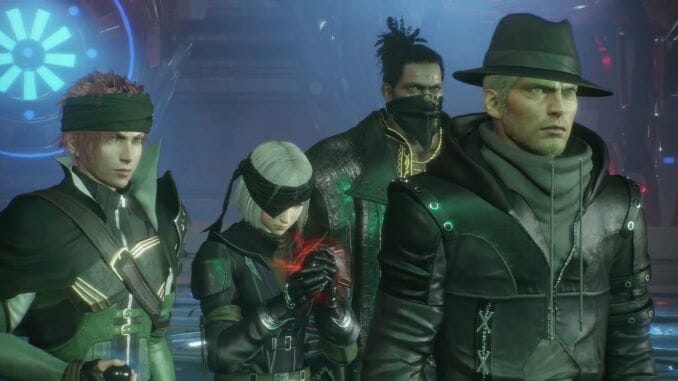This article contains spoilers for Stranger of Paradise: Final Fantasy Origin.
If you know one thing about the protagonist of Stranger of Paradise: Final Fantasy Origin it is that he is here to kill Chaos. Announced with a frankly all time hilarious trailer that consisted almost entirely of characters saying “Chaos!” in increasingly angry voices, the game quickly and understandably took on a reputation as beautifully stupid, edgy trash that is only partially in on the joke.
And to be clear: it is. I’m about to spend a few hundred words arguing this game’s storytelling merits, but only a fool would say that it isn’t funny when Jack Garland takes out his actual real cell phone and starts blasting rap rock when another character challenges his worldview. But the audacity of the game isn’t the core of why it’s good. Stranger of Paradise doesn’t go for the ridiculous heights of its peers; this isn’t Metal Gear Rising, where the tone is pushed to the breaking point in constant escalation throughout the game. At the end of the day, despite all signs to the contrary, they simply made a pretty good, pretty normal Final Fantasy game.
The game does not put its best foot forward, opening with a series of jarring and contextless cutscenes stitched together with menus and title screens where it’s unclear if you’re witnessing the scars of a troubled development cycle or if the game is simply this weird. This is also where the bulk of Jack yelling about Chaos is located, or asking every character he finds if they are Chaos, or actively trying to skip the cutscene from within the cutscene. If you’ve only played the first few hours, the claim that this is a regular, thoughtful Final Fantasy game will seem strange. But over time much of the dissonance lessens, both as the strangeness of the game’s design settles into a far more comfortable loop of dungeons and cutscenes, and as it actually starts cashing the narrative checks it was writing.
In line with recent games worked on by Kazushige Nojima and Tetsuya Nomura, Stranger of Paradise is a lightly metatextual JRPG where the characters debate the value of this form of storytelling. Jack is a Lufenian, an ancient race from the original Final Fantasy expanded to be—let’s not beat around the bush here—literally just Square Enix. They maintain the balance of Darkness and Light across all the dimensions, dimensions we see bleed into the levels from the original Final Fantasy to XV, all themed around areas from each mainline Final Fantasy game. When the balance is disrupted, they send in Warriors of Light, amnesiac protagonists to complete their quest and balance the world from falling to Chaos.
Stranger of Paradise openly discusses long standing critiques of the series and genre that ultimately Warriors of Light can only ever be reactionary forces in favor of the status quo, a childish fantasy that you can defeat the world’s suffering by beating up a single big guy, rather than actually dealing with the complex material conditions that the people live in. Neon says as much in one of the first cutscenes, before Jack responds with a song that, despite what people online may tell you, sounds absolutely nothing like Limp Bizkit. Jack’s arc throughout the game is a slow realization that his refusal to think critically about anything, or talk to anyone, or even watch the cutscenes without skipping them is what’s stopping him from actually understanding the problems he faces. Stranger of Paradise argues that you don’t beat a game by beating its final boss any more than you beat a novel on the final page.
At the end of the game, Jack becomes Chaos and tries to destroy the Lunefians and stop the cycle of Warriors of LIght. Yet after (what else) remembering that his friends are his power he hesitates and decides instead to travel back in time and make Final Fantasy happen. It’s the most generic and predictable ending possible, but within the context of the journey is a satisfying and resonant conclusion to this celebratory anniversary game. Yeah, the Warriors of Light are a childish and reactionary idea, but that doesn’t mean their story is totally without value.
It is important to say that this is nothing new for the series, and not just because much of this team is also working on Final Fantasy VII Remake right now. FFX-2 is a game entirely about what happens to the world after you’ve killed god but all the societal forces that existed yesterday still exist today. FFVI is a game where you famously lose to the bad guy, and must confront the worth of storybook heroism in a world that can’t be saved. And Final Fantasy, where it all began, is a game where the heroic quest is written out of existence, and ends declaring the true crystals reside inside the player’s heart.
Ultimately Strangers of Paradise is perfect, not because it’s the greatest game or one of the richest and most exciting tales they’ve ever told, but because it’s a clear eyed reckoning with the limits and faults of the series. It’s just a mid-budget 7/10 JRPG with some of the worst level design you’ve seen in your damn life, some characters you really like, a few moments that’ll make you sad and a few moments that’ll make you cheer. The Final Fantasy fandom often devolves into factional war about when the series started being good, stopped being good and started being good again. Stranger of Paradise is a needle to pop that bubble, showing the series in the light of day as just some pretty good videogames made by a company. There’s just a hero in a silly hat, and at the end they play a great song. What could be more Final Fantasy than that?
Jackson Tyler is an nb critic and podcaster at Abnormal Mapping. They’re always tweeting at @headfallsoff.
